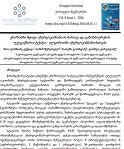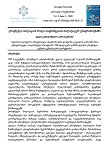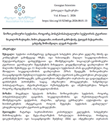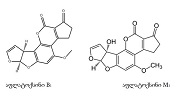Youthful Perspectives: National Identity Trends in Georgia's Gen Z
Downloads
This article delves into the nuanced fabric of national identity among Georgian Generation Z, unraveled through a multifaceted exploration employing secondary data analysis of quantitative information, qualitative content analysis, and in-depth interviews. Situated within the broader context of Georgian Nationalism and international trends in generational perspectives, the research unveils both shared elements and distinctive characteristics shaping the identity landscape of Georgian iGen'ers. The findings illuminate a generational shift, emphasizing the dynamic nature of how Georgian youth perceive their national identity. Generation Z, born into a world saturated with the Internet and global connectivity, exhibits similarities and differences compared to international trends. Commonalities include a heightened sense of equality, commitment to inclusivity, skepticism toward political institutions, and a preference for libertarian ideology. Despite growing up in the Internet and social media era, Generation Z exhibits cautious trust in the media, reflecting an acute awareness of misinformation and the imperative of verification. The generational cohort displays a global outlook, with increased trust in international organizations and a desire to join NATO and the European Union while maintaining a significant focus on the nation-state. Noteworthy trends within Generation Z include a decline in religiosity and fatalism, an embrace of civic activism and protest, and a nuanced understanding of the distinction between Georgianness and Georgian citizenship. Ethnic minorities are recognized as integral parts of the nation, departing from ethnic nationalism. Distinct national markers identified through civil demonstrations include a solid attachment to the Georgian people, a pronounced enemy image directed at the Soviet Union and Russia, and emotional connections with national symbols such as the map, flag, Georgian banquets, and the history of the fight for independence. In conclusion, this study enriches the discourse on national identity formation by offering a constructive narrative that navigates beyond primordial perspectives. The identified national markers, manifest in civic activism, enemy imagery, and emotional connections with symbols, collectively contribute to a materialised expression of national identity and a source of pride among Georgian Generation Z.
Downloads
Bogishvili, D., Osepashvili, I., Gavashelishvili, E., & Gugushvili, N. (2016). Georgian National Identity: Conflict And Integration. Tbilisi: Nekeri.
Broadbent, E., et al. (2017). What the world’s young people think and feel: Generation Z. Global citizenship survey. Varkey Foundation, London.
Brubaker, R. (1996). Nationalism reframed. Cambridge: Cambridge University Press.
Davitashvili, Z. (2003). Nationalism and Globalization. Tbilisi: Open Society – Georgia Foundation.
Feinstein, Y. (2023, January 6). Nation-state. Retrieved from Encyclopedia Britannica: https://www.britannica.com/topic/nation-state
Firalishvili, Zaza. (2007). Theatrical dialectic of Georgian politics. In: Sesili Dzebniauri (ed.). The letters about Georgian identity. Tbilisi: Caucasus Institute for Strategic Surveys, pp. 99- 268.
Gellner, E. (1983). Nations and Nationalism. Oxford: Blackwell publishers.
Giddens, A., & Sutton, P. W. (2017). Sociology (8th ed.). Polity Press.
Hobsbawm, E. (1990). Introduction. In E. HOBSBAWM, Nations and nationalism since 1780 (pp. 1-13). Cambridge: Cambridge university press.
Karklins, Rasma. (1989). Ethnic relations in the USSR: the perspective from below. Boston and London: Allen and Unwin.
Kellas, J. (1998). Ethnic and Social Nationalism. In J. Kellas, Ethnic and Social Nationalism (pp. 65-88). New York: ST. MARTIN'S PRESS.
McCrone, D., & Bechhofer, F. B. (2015). Understanding National. Cambridge: Cambridge University Press.
Mannheim, Karl. (1928) 1972. “Competition as a Cultural Phenomenon.” Essays on the Sociology of Knowledge, by Karl Mannheim, edited by Paul Kecskemeti. Fifth impression. London: Routledge & Kegan Paul. Originally published in 1952.
Mataradze, Teona. (2015). Rural Locals, Distant States: Citizenship in Contemporary Rural Georgia. Unpublished Ph.D. thesis submitted to the Martin-Luther University Halle-Wittenberg.
Mill, J. S. (1977). The Collected Works of John Stuart Mill. University of Toronto Press., 19, 546.
Motyl, A. J. (1992). The Modernity of Nationalism: Nations, States and Nation-States in the Contemporary. Journal of International Affairs, 45, 307-323.
Mühlfried, Florian. (2014). Being a State and States of Being in Highland Georgia. New York, Oxford: Berghahn.
Oleh S. Turenko, B. V. (2020, November no info). THE STATE – IN INTERPRETATION OF JOSE ORTEGA Y GASSET. ANNALS OF THE UNIVERSITY OF CRAIOVA.HISTORY, 38, pp. 77-87. Retrieved from http://www.istoriecraiova.ro/wp-content/uploads/2020/12/2020_2_ANALE_PRIMELE-PAGINI.pdf
Parekh, B. (1995). The concept of national identity. Journal of Ethnic and Migration, 21(2), 255-268.
Seemiller, C., & Grace, M. (2016). Generation Z goes to college. Jossey-Bass.
SHULMAN, S. (2002). Challenging the Civic/Ethnic and West/East Dichotomies in the Study of Nationalism. Comparative Political Studies, 35(5), 554-585.
Smith, A. D. (1989). The origins of nations. Ethnic and Racial Studies, 340-367.
Smith, A. D. (1991). National and Other Identities. In A. D. SMITH, NATIONAL IDENTITY (pp. 1-18). London: The Penguin Group.
Smith, Anthony D. (2006). Ethnicity and nationalism. In: Delanty Gerard and Kumar Krishan (eds.). The sage handbook of nations and nationalism. London: SAGE Publications, pp. 169- 181.
Tarkhan-Mouravi, George and Smite, Sintija (2007). Roots of the Georgian nationalism. Paper presented at the Conference Ilia Chavchavadze and his epoch. Tbilisi, Georgia, 6 November, 2007.
Tuminez, A. S. (2003). Nationalism, Ethnic Pressures, and the Breakup of the Soviet Union. Journal of Cold War Studies, 5(4), 81-136.
Turenko, O.S., Derevyanko, B.V., Ivanov, I.V., Hrudnytskyi, V.M. & Rudenko, L.D. (2021). The state – in interpretation of Jose Ortega Y. Gasset. Analele Universitatii din Craiova ‒ Seria Istorie, 25(2), 77– 88
Twenge, Jean M. (2017). iGEN: why today's super-connected kids are growing up less rebellious, more tolerant, less happy-- and completely unprepared for adulthood and (what this means for the rest of us). New York: Atria Books.
Tyndal, J. (2013). Culture and Diversity in John Stuart Mill's Civic. Utilitas, 25, 96-120. doi:doi:10.1017/S0953820812000337
Zedania, G. (2010). Issues of National Identity in Georgia. Solidaroba, 37(4), 4-7.
Other Sources:
Caucasus Research Resource Center. (2022). Caucasus Barometer 2021. Tbilisi: CRRC.
Georgian Public Broadcaster. (2023, March 9). #Moambe at 21 o’clock. 9th of March, 2023 #[Video]. YouTube. https://www.youtube.com/watch?v=CzfiA0yzfJM
Heinrich Boll Siftung. (2021). Georgia’s Youth and History: Experience, Attitudes and Values. Tbilisi: Boell.ge
Koberidze, T. (2023, March 13). Tbilisi, Georgia
National Statistics Office of Georgia. (2022). Number of Population as of January 1, 2022. Tbilisi: Geostat.
Copyright (c) 2023 GEORGIAN SCIENTISTS

This work is licensed under a Creative Commons Attribution-NonCommercial-NoDerivatives 4.0 International License.


























































































































































































































